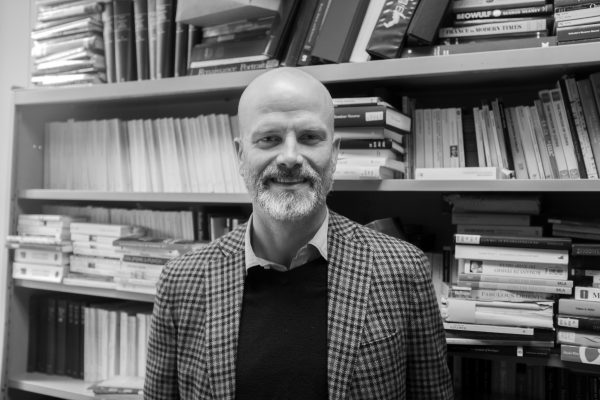Speaking His Language: An Interview With Andrew Clark
Dr. Clark stated that “for the University to function, you have to take care of its people.” (JOSE EMILIO VALCARCEL/THE OBSERVER)
February 25, 2018
The moment you enter Dr. Clark’s office, you will presumably notice the amount of books surrounding his desk, almost reaching the ceiling of his office. French dictionaries, English novels, Hegel’s philosophical books ― his fascination for literature is obvious.
Dr. Andrew H. Clark is among the most reputable professors in Fordham College at Lincoln Center (FCLC). His interests in social justice and his significant advocacy for rights have led him to become the Vice President of the Faculty Senate on campus, as well as the Chair of Faculty Salary & Benefits Committee. In addition to those positions, Dr. Clark is also a professor of French and Comparative Literature at FCLC.
He also received an award for participating in the “Racial Solidarity Network” in the Fall of 2017, signifying that he has completed the Office of Multicultural Affairs’ training program last semester at Fordham. This framed award further shows his commitment to social issues on campus.
Although Dr. Clark speaks with a slight French accent that he picked up during his year studying abroad in Paris as an undergraduate student, he grew up in San Francisco, CA. He moved to Massachusetts for college, where he was an English and French major at Amherst College. He initially leaned towards studying medicine, as his father was a doctor, but he “loved literature and examining texts” in a different language as he deems it more special. He stated that he “thought it was so extraordinary that you could spend such a long period of time analyzing prose in French.”
After completing his Bachelor’s Degree at Amherst College, he interned in the French Embassy of D.C. before deciding to pursue a PhD at Princeton University, where he mainly did research projects, as it was one of his passions. Dr. Clark wanted to primarily focus his studies on 17th-18th century French literature as he “worked with fantastic professors” at Amherst College who essentially sparked his interest in this specialization.
When asked about what had sparked his interest in wanting to become a French professor, he shared that at the age of 16, as he was on a train going from Italy to France, he found that “there’s something fascinating about being able to communicate with people” despite the lack of languages in common. Although he spoke minimal French and Italian, he had learned Spanish in high school, which ultimately allowed him to “figure out ways to communicate by piecing together whatever languages [he] could grab on to.” He also stated that intertwining languages with “an informal exchange of ideas in a very multilingual setting was eye opening.”
When he was an undergraduate student at Amherst, he studied abroad in Paris for a year, and said that “the experience of living in another country, is a clichéd experience at this point, but I think it is a transformative one”, which further assured him of his decision of wanting to study and eventually teach the French language.
Dr. Clark wrote “Diderot’s Part” in 2008. He was drawn to write a book about the philosopher as he had written part of his undergraduate thesis on him and the issue of involuntary memory. He stated that “I think what interested me about Diderot and the 18th century in particular was that it was at a time in which literature encompassed science, philosophy, theatre, and art.” As Dr. Clark spoke about Diderot, you could clearly see the fascination in his eyes, and the evident amount of knowledge he has on the philosopher.
“Diderot’s Part” incorporates different areas of study, such as music, art and physiology. Dr. Clark also said that writing this book was a good basis to begin his future projects as all of the interests he has “wouldn’t have come about without the grounding I had from working on Diderot.” The first major project after publishing “Diderot’s Part”, that was in collaboration with a musicologist who used to be a professor at Fordham, was a book that mainly discussed how the different disciplines perceive music. He is currently working on another project, with a colleague at NYU, that focuses on the representation of texts and paintings, and how Gutenberg’s printing press affected the meaning produced by the medium of paintings.
Dr. Clark became the chair of the Salary and Benefits Committee in 2008 as a relatively new tenured professor. He also worked with the Faculty Senate where they “had to deal with complicated issues such as health care, and the fact that the University was changing health care options without the faculty’s permission”. He assumed leadership in the Faculty Senate and he stated that he “saw Salary and Benefits as a place where one could try to enhance the benefits we have and make them more in line with the understanding of what a modern University should look like.”
As Chair, he implemented Legally Domiciled Adults rights (LDA) in order to provide healthcare for same sex couples at Fordham for the first time. He stated that their main purpose is trying to “bring this University in to the 21st century.” However, according to Dr. Clark, the reason why he became nominated Chair of the Salary and Benefits Committee was because of the “Course Load Relief” initiative, a project that focused on non-gendered, non-biologically specific child care.
Although it was a process that took several years, the Salary and Benefits Committee eventually succeeded in providing women and other primary caregivers the right to take time off in order to take care of their children, whether they are foster, adopted or biological children. This initiative was launched in response to Fordham’s policy that theoretically outlined that only women who gave biological birth to children during the semester had access to maternity leave.
The Salary and Benefits Committee strives to protect the rights of the Faculty and make their voices be heard as Dr. Clark stated that “for the University to function, you have to take care of its people.” Although he has held the position of Chair for nearly a decade, he will continue to actively fight for social justice on Fordham’s campus.













